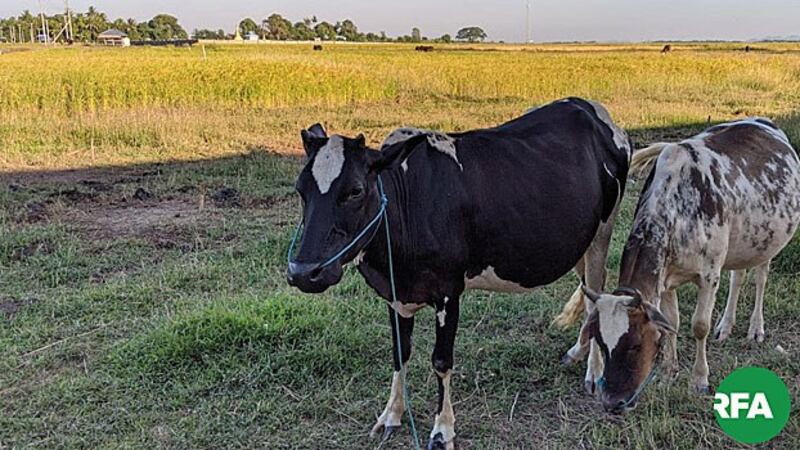A unilateral cease-fire extended into the New Year by the “Three Brotherhood Alliance” of ethnic armies battling Myanmar’s armed forces appeared to make little difference as residents across the conflict zone in Rakhine state reported fighting this week.
Local lawmakers and villagers said Thursday that the armed conflicts have continued despite the cease-fire announcement by the Arakan Army (AA) and its allies the Ta’ang National Liberation Army (TNLA) and the Myanmar National Democratic Alliance Army (MNDAA).
They had announced Wednesday that they were extending a temporary unilateral cease-fire against Myanmar forces until Feb. 29 to allow more time to implement negotiations with the Myanmar military — the second extension since September.
The three ethnic armies, which along with the Kachin Independence Army (KIA) form the Northern Alliance, have been meeting with government peace negotiators to discuss bilateral truces, but have made little headway. The parties have agreed to meet again in January.
The AA said armed conflicts are continuing because the military has used excessive force to intrude into its territory.
The military blames the Northern Alliance, though, saying it violated its own cease-fire by attacking military posts, expanding its territory, and extorting money from vehicles on national highways.
“They are making announcements, but they are acting however they want. We are not interested in their announcement,” said Myanmar military spokesman Brigadier General Zaw Min Tun.
“They may do what they want. We will carry out our duties,” he said.
AA spokesman Khine Thukha told RFA’s Myanmar Service that his group was fighting because “the military will not stop the offensives.”
“Since they have kept launching offensives against us, we don’t have a choice but to fight back in defense,” he said.
Dozens of civilians have died in the crossfire or from landmines in the hostilities between national soldiers and the AA that escalated a year ago when the Arakan force ramped up attacks on police outposts in its quest for greater autonomy in the state.

Fighting affects farmers
The ongoing clashes in seven townships in northern Rakhine state meanwhile have prevented many farmers from harvesting crops on more than 10,000 acres of paddy fields, flooded parcels of arable land for growing semiaquatic crops like rice and taro, an official from the Rakhine Farmers’ Union said Thursday.
“Currently, there are more than 15,000 acres of farmland that need to be harvested in seven townships with active armed conflicts,” the organization’s chairman, Kyaw Zan, told RFA.
“It’s now halfway through the harvesting season,” he said. “We will wait and see how much these figures will grow in the second half of the season.”
Of the more than one million farms in Rakhine state, over 35,000 acres of farmland were not cultivated during the previous monsoon season due to continued fighting, Kyaw Zan said.
Farmer Tun Aye from Amyat Taung village in Rathedaung township said he had cultivated five acres of paddy fields, but could not harvest their crops until today.
“The armed conflicts intensified during the harvesting season,” he said. “We had to flee to Rathedaung town as IDPs [internally displaced persons]. My house was burned down in a shelling blast.”
“We tried to go back and harvest crops on our farmland, but military troops are still firing with heavy shelling,” Tun Aye said. “There are more than 30 farmers with unharvested farmland in our village.”
Most of the paddies are "too ripe" now to be harvested and have been lost, raising concerns about food supplies for farming families this year, he said.
Kyaw Lwin, Rakhine state’s minister for agriculture, livestock, forestry, and mines, said there are only a few farms left whose paddy fields need to be harvested.
"There are not many paddies left to be harvested — only some high-end paw hsan hmwe [rice] varieties left," he said. "The rest of the farms are almost finished harvesting."
“It is not possible to harvest all the farms in the conflict areas, but they can be harvested when there is no fighting,” he said, adding that the state government is willing to meet with farmers to discuss how it can help them.
Indiscriminate firing
On Dec. 6, the Rakhine Ethnic Congress issued a statement demanding that armed groups avoid fighting in areas with crops being harvested and urged Myanmar military authorities to order their troops not to fire weapons.
“Farmers cannot harvest the paddies because the Myanmar military has been firing its artillery indiscriminately,” AA spokesman Khine Thukha told RFA.
“The military’s infantry battalions fire at the farmers if they are [ethnic] Rakhines,” he said. “That’s why the farmers are too afraid to go out and harvest crops. The Myanmar military is the reason the farmers cannot harvest their crops.”
Myanmar military spokesman Brigadier General Zaw Min Tun denied the accusation that government troops were creating problems for farmers.
“This is not something we military members do,” he said. “Only Arakan Army members commit acts like starting the battles near villages, firing from villages, and planting landmines.”
“We have always said not to start fighting near villages, roads, and bridges,” he said. “If they do, it will only affect local civilians. We have repeatedly warned that.”
Zaw Min Tun also said that the military tries to distinguish civilians from insurgents and does not attack civilians.
Reported by Min Thein Aung for RFA’s Myanmar Service. Translated by Ye Kaung Myint Maung. Written in English by Roseanne Gerin.
